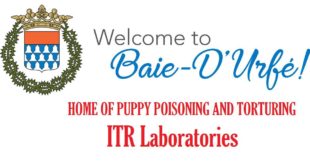Provided by Zoe- It’s our Nature
Zoe Staff Report
New restrictions on animal protection charities in Canada would prevent them from speaking out against factory farming, puppy mills, hunting, the slaughter of baby seals, vivisection and cruel sports.
The new regulations, put forward by the Canada Revenue Agency, state that:
“Under common law, an activity or purpose is only charitable when it provides a benefit to humans.”
Therefore:
“If a purpose or activity that promotes the welfare of animals harms humans, or has a real potential to cause significant harm to humans, it is likely not charitable … Some activities may promote the welfare of animals but also cause, or have the potential to cause, harm to humans. The harm could take many forms, including physical or economic harm, or direct or indirect harm.”
Specifically, according to the new policy, “seeking to abolish vivisection is not charitable.” Nor is seeking to stop cruel practices at factory farms or, indeed, any other activities that could cause economic harm to humans.
Overall, there’s very little outside of caring for animals at shelters that would still be considered charitable.
Here are some excerpts from the document that lays out these policies:
2. Under common law, an activity or purpose is only charitable when it provides a benefit to humans.
3. To be charitable, the benefit to humans must always take precedence over any benefit to animals. If a purpose or activity that promotes the welfare of animals harms humans, or has a real potential to cause significant harm to humans, it is likely not charitable.
23. Promoting the welfare of animals is only charitable when it results in a benefit to humans. Purposes that benefit animals, but not humans, are not charitable.
28. Some activities may promote the welfare of animals but also cause, or have the potential to cause, harm to humans. The harm could take many forms, including physical or economic harm, or direct or indirect harm.
29. Any benefit or potential benefit to the welfare of animals must be balanced against any harm or potential harm to humans when deciding whether an organization or activity that promotes the welfare of animals is charitable. The public benefit resulting from promoting the welfare of animals must clearly outweigh any harm or potential harm to humans.
30. For example, the courts have decided that seeking to abolish vivisection is not charitable.
31. In short, when weighing benefits to animals against benefits to humans, “the life and happiness of human beings must be preferred to that of animals.”
42. When advancing education, the charity cannot simply promote a particular point of view. If an organization tries to influence public opinion or actions on a controversial issue, it is not advancing education in the charitable sense.
43. For example, a charity might offer courses in how to minimize harm to local wildlife and ecosystems that tend to result from human activity. However, if the charity were to try to convince people that certain legal hunting practices were morally wrong and should be abolished, it would not be advancing education in the charitable sense.
The proposed regulations are published here, and Canadians have the opportunity to comment on them until March 31st.
 Montreal Dog Blog Montreal's Online Dog Park
Montreal Dog Blog Montreal's Online Dog Park




